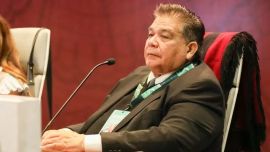Paraguay voters gave the conservative Colorado Party a third straight mandate to run the nation, defying a trend that booted out incumbent governments elsewhere in Latin America.
Santiago Peña, a 44-year-old former finance minister topped his closest rival in a crowded field by 16 percentage points, according to the latest tally after Sunday’s election.
Efraín Alegre, a former public works minister leading a coalition of leftists and conservatives, conceded after winning about 27 percent of the vote. Anti-establishment candidate and ex-senator Paraguayo ‘Payo’ Cubas received 23 percent of ballots.
The results make Paraguay an outlier in a region where angry voters in countries including Chile and Colombia dumped more traditional parties in recent years to embrace left-wing candidates who promised change. While polls had shown a tight race between Alegre and Peña, the incumbent had an advantage in Paraguay, where the two main opposition candidates split the vote. Unlike many countries in Latin America that hold a run-off election if the leading presidential candidate doesn’t get a majority of the vote, Paraguay requires only a plurality to win.
The Colorado Party, which has governed in dictatorship and democracy for the better part of 80 years, also won majorities in the Lower House and Senate, local newspapers reported. Peña, who starts his five-year term August 15, called on Paraguayans to put aside their differences and work together to improve living standards.
“We have a lot to do after the recent years of economic stagnation, worrying levels of unemployment and the increase in the poverty rate,” he said in a televised address to supporters. “The task that awaits us isn’t for a single person or party.”
Peña inherits an economy that averaged paltry annual growth of just 1.2 percent in the past five years due to the pandemic and droughts that slashed key exports of soy and hydro power. Poverty, which still hasn’t returned to pre-pandemic levels, affects about a quarter of this California-sized country’s 7.5 million people.
The president-elect has also promised to spend more on social programmes, infrastructure and housing while leaving the country’s notoriously low tax rates unchanged.
Peña also faces the challenge of stepping out of the shadow of his political mentor Horacio Cartes, an ex-president who is now the Colorado Party chairman. Cartes, one of Paraguay’s wealthiest businessmen, is under US financial sanctions for alleged corruption and ties to terrorism.
Paraguay’s alliance with Taiwan, which gave Sunday’s vote outsized geopolitical importance, looks safe for now. Peña pledged on the campaign trail to preserve the relationship with the self-governing island nation that China claims as a renegade province, which in practical terms means his country can’t directly sell its soy and beef to China.
related news
by Ken Parks, Bloomberg























Comments